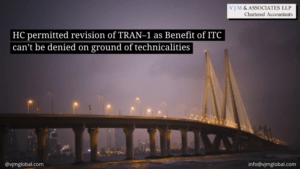The Hon’ble Delhi High Court under the division bench of Honourable Justice Vipin Sanghi and Honourable Justice Sanjeev Narula has passed a landmark judgement allowing to file transition credit via TRAN 1 filing till 30th June 2020. It further directed the tax department to widely convey this judgement to file TRAN-1 across the public domain via publishing on their website so that whosoever could not claim the benefits can claim now.
The judgement has been pronounce in the case of M/s Brand Equity Treaties Limited, Micromax Informatics Limited, Developer Group India Private Limited, Reliance Elektrik Works Vs The Union of India and others (W.P.(C) 11040/2018 and C.M. No. 42982/2018, W.P.(C) 196/2019& CM APPL. 965/2019, W.P.(C)8496/2019, W.P.(C) 13203/2019)
(refer table below)
In the given case, petitioners failed in GST TRAN 1 filing due to their own follies and the respondent prevented them from forwarding CENVAT Credit accumulated as of 30th June 2017 to the GST regime.
Petitioner contended that CENVAT Credit is a vested right under Article 300A and therefore can’t be taken away merely due to non-fulfilment of conditions which are procedural into nature. Therefore, Rule 117 of CGST Rule, 2017 is not mandatory into nature.
However, the respondent contended that a delay in GST TRAN 1 filing was not made due to any technical glitches.
Hon’ble Delhi HC held that the term used in Rule 117(1A) of CGST Rules, 2017- “technical difficulties on common portal” can’t have a very narrow interpretation and it can’t be used for difficulties arising due to respondent. It would include difficulties faced by taxpayers. Just like respondent, petitioners also require time to adapt to a new system. Further, time limit prescribed for availment of ITC pertaining to pre-GST regime should not be discriminatory and unreasonable.
As the judgment states now taxpayers across the country can GST TRAN-1 filing to get the CENVAT or the Input Tax Credit up until 30th June 2020.
Here in this article, we have represented a simplified structure of all the essential facts about the case. Have a look below to get the complete overview.
1. Brief Facts of the Case GST TRAN 1 Filing
Issue faced by various petitioner as given in below table
| Name of Petitioner | Issue in case |
| Brand Equity Treaties Limited W.P.(C) 11040/2018 and C.M. No. 42982/2018 | Petitioner claimed CENVAT credit in service tax return for the period of April to June, 2017. However, GST TRAN-1 could not be filed within the prescribed time limit because of involvement of multiple entities in preparation of data.. |
| MicroMax Informatics LtdW.P.(C) 196/2019& CM APPL. 965/2019 | Petitioner claimed CENVAT credit in service tax return. However, he filed GST TRAN-1 form on 24th November, 2017 to avail transitional credit but forgot to carried forward such ITC in GST TRAN-1. Despite repeated follow ups, respondent disallowed credit as same did not get auto populated in GST TRAN-01. |
| Developer Group India Pvt LtdW.P.(C) 8496/2019 | Petitioners claimed CENVAT credit in service tax return filed for April, 2017 to June, 2017. Petitioner applied for such refund under section 142(3) of CGST Act but could not complete due to some technical error. Petitioner was later informed that the petitioner is not entitled to claim refund and therefore filed a physical copy of GST TRAN-01 on 24th August, 2018 with all supporting documents. However, nothing was heard in this regard. |
| Reliace Elektrik WorksW.P.(C) 13203/2019 | The petitioner was also unable to file TRAN-1 due to some errors in the system within the due date and due to utter confusion. Petitioner also tried to get a solution from the respondent but no effective resolution was found. |
Accordingly, all four petitioners seek identical relief in the nature of directing the respondent to permit the ailment of accumulated CENVAT Credit as of 30th June 2017 by filing a declaration in form GST TRAN 1 filing beyond the period specified in CGST Rules.
The writ petition also questioned the constitutional validity of Rule 117 of the CGST Rules, 2017 on ground of arbitrary and violates provisions of Article 14 of Constitution.
2. Legal Reference in case
- “Section 140 – Transitional Arrangement of Input Tax Credit” of the CGST Act, 2017 specifies that every registered person is entitled to carried forward CENVAT Credit filed in the return for the period ended on 30.06.2017 subject to fulfillment of specified conditions.
- “Rule 117-Tax or duty credit forward under any existing law or on goods held in stock on the appointed day” specifies:
- Every registered person entitled to take credit under section 140 shall file an electronic declaration in GST TRAN-01 within 90 days from 01.07.2017.
- Further, the commissioner may extend such period of 90 days by a further period not exceeding 90 days.
- Commissioner may further extend the due date of filing of GST TRAN-01 by a further period, not beyond 31.03.2019 for such registered persons who failed to file a declaration by 27.12.2019 due to technical glitches. (Sub-Section (1A) of Section 117 inserted)
- Article 14: Equality before law: The State shall not deny to any person equality before the law or the equal protection of the laws within the territory of India Prohibition of discrimination on grounds of religion, race, caste, sex or place of birth.
- Article-300A-Persons not to be deprived of property save by authority of law- No person shall be deprived of his property save by authority of law
3. Contention of the petitioners – The time limit for GST TRAN 1 filing is a procedural condition rather than a mandatory provision
Petitioner contended on following grounds:
- GST System at the relevant point of time or even today is in a nascent “Trial and Error” phase. Therefore, petitioners can’t be made suffer due inefficiency in the system of respondent.
- The CENVAT credit is the property of the petitioner which is a vested right and very much protected constitutionally through the Article 300A of the Constitution.
- The petitioners claimed that the government can’t take away such vested right on account of inability to fulfil any conditions that are too procedural in nature.
- They further pleaded to the honorable court that the time to time extensions from the tax department to file claims for CENVAT credit is a clear indicator of the technical errors on the common portal. It also shows that the time limit for GST TRAN 1 filing is a procedural condition rather than a mandatory provision.
4. The Union of India and ORS submitted- Accumulated CENVAT Credit is not a vested right and can’t be claim to perpetuity
- The respondent demolished all the claims of petitioners as petitioners could not show any significant proof which exhibits their claim for technical glitch.
- Petitioners do not deserve any sympathy; it exhibited a casual approach on part of the petitioner in GST form TRAN 1 filing.
- In all earlier precedents, the extension was granted as there existed some technical glitch due to which GST TRAN 1 filing could not be filed within time.
- In the given case, petitioners filed GST TRAN 1 filing for the first time after the expiry of the due date.
- Further, Rule 117 is also valid as section 164(1) of CGST Act, 2017 authorises the government to make rules for carrying out provisions of the act on recommendation of council.
- Accumulated CENVAT Credit is not a vested right and can’t be claimed to perpetuity. Credit is in the nature of benefit/concession extended as per act. Therefore, rules can be framed for granting benefits.
5. Observations of the Honourable Delhi High Court
Observation of Hon’ble Delhi High Court is as follows:
5.1 The tax department could not meet the expectations and serve the needs of taxpayers
- The honorable court held that the transition from the former tax regime to GST to avail the tax credit was supposed to be done through an electronic declaration submission in Form GST TRAN 1 filing.
- The tax department has extended the due date of filing several times up until 27th December 2019. However, still, there were many taxpayers who could not meet the deadline.
- The major reasons behind it were the inadequacies in the network of the respondents. The tax department could not meet the expectations and serve the needs of taxpayers. Further, due to low bandwidth, many taxpayers could not file GST TRAN 1 filing on time.
- Consequently, IT Grievance Redressal Committee was constituted and assigned the tax of addressing grievances of taxpayers.
- Some of those claims were settled at the governmental level while there were many taken to court. In most of such cases, the decisions were given in favour of taxpayers.
- Respondent also acknowledged the issue and extended the time limit of filing of GST TRAN-01 under Rule 117(1A) of CGST Rules, 2017. Rule 117(1A) authorised commissioner to extend the due date of filing GST TRAN-01 in respect of those registered persons who could not file the same due to technical glitches.This substantiates that the period for filing the TRAN-1 is not considered as sacrosanct or mandatory.
- In some of the cases that came before the court, delay in filing of GST TRAN-01 was due to error on part of the taxpayer or due to lack of understanding of the complete Indirect tax system. Even in these cases, court gave benefit of doubt to the taxpayer and allowed to file form beyond due date.
- In the given case, petitioners either did not keep a track on the timelines or they have been wrongly directed because of the chaos and confusion prevailed at the time of introduction of the GST regime. That’s the reason why they don’t have enough proof to convincingly exhibit that they have faced technical difficulties while submitting TRAN-1 on GST portal.
5.2 Government can not curtail the accrued or vested right and restrict it to 90 days
- Section 140(1) of CGST Act enables a registered person to carry forward the ITC accumulated as on 30th June, 2017. Provisions of Service tax were repealed by GST provisions.
- Credit on 30th June, 2017 was accumulated, acquired and vested on 30th June, 2017 as it was appearing in CENVAT register. Therefore, credit was required to be transitioned to new regime.
- Time limit of filing of GST TRAN-01 was extended multiple times and it went much beyond the period originally envisaged and has still not expired. Thus, there is nothing sacrosanct about the time limit so provided.
- Further, arbitrary classification under Rule 117(1A) restricting the benefit to only those taxpayers whose cases are covered by “technical difficulties on common portal” is arbitrary, vague and unreasonable.
- “Technical Glitches” is a broader term that can not be restricted only to the difficulties faced by the respondent. It will includes technical difficulties faced by the taxpayer as well including taxpayer’s follies.
- A complete new system was implemented including new accounting system, reporting of turnover; claiming credit of prepaid taxes; and, payment of taxes. Just like respondents, even taxpayers need time to adapt to the new system.
- It is unfair on the part of respondent to expect taxpayers to be fully geared to deal with new system then respondent was himself ill-prepared.
- The phrase “technical difficulty” has been given a very restrictive meaning which is supplied by the GST system logs.
- Hon’ble HC mentioned that It is unfair to create differentiation and restrict benefit to technical snags alone. There could be various different types of technical difficulties occurring on the common portal which may not be solely on account of the failure to upload the form.
- Purpose of Rule 117(1A) was to save and protect the rights of taxpayers to avail of the CENVAT credit lying in their account. That objective should also serve other taxpayers, such as the petitioners. The approach of the Government should be fair and reasonable. It cannot be arbitrary or discriminatory, if it has to pass the muster of Article 14 of the Constitution.
6. Judgement : 30th June 2020 should be Last date of Claiming CENVAT Credit via TRAN-1
- “Technical Glitches” is a broder term and can’t be restricted to the difficulties being faced by the respondent.
- Time Limit prescribed for availing ITC with respect to goods purchased in pre-GST regime can’t be discriminatory and unreasonable. There has to be a rationale forthcoming and, in absence thereof, it would be violative of Article 14 of the Constitution.
- CENVAT credit vested is the property of the assessee, and is a constitutional right under Article 300A of the Constitution. The same cannot be taken away merely by way of delegated legislation by framing rules, without there being any overarching provision in the GST Act.
- A procedural directory can’t overlay or contrary to substantive right vested under sub Section (1) of Section 140.
- Since Section 140 does not provide statements related to the consequences in case of delayed filing of TRAN-1, the rule 117 needs to be read and understood as a directory but not mandatory.
- Hon’ble Delhi HC held that Section 117 is directory in nature as far as it prescribes the time-limit for transitioning of credit. Therefore, same would not result in the forfeiture of the rights, in case the credit is not availed within the period prescribed.
- This however, does not mean that the availing of CENVAT credit can be in perpetuity. Since there are no specific provisions under the Act, the hon’ble court held that in terms of the residuary provisions of the Limitation Act, the period of three years should be ideal. Hence, the court judged that three years from the appointed date would be the maximum period to avail CENVAT credit.
Since in this case all the Petitioners have filed or tried to file TRAN-1 within the due date of three years they must have to be entitled with the ITC. Thus, they have the permissions to file TRAN-1 within 30.06.2020.
7. Conclusion
The most crucial aspect of this judgement is the Hon’ble Delhi High Court has instructed the tax department to convey this decision across the public domain. The order will be applicable to all taxpayers who are unable to file TRAN-1 and claim the ITC no matter whatever the reason is.
Though the court has mentioned that the revenue department must allow online as well as offline filing of TRAN-1. But with the current lockdown in effect, there is very little space for taxpayers to file the TRAN-1 offline.
If you need any further info on tax compliance, don’t forget to put your query. Read more about How to Determine Taxability of Foreign Resident in India
Note: Please refer to the original judgement for detailed understanding.




